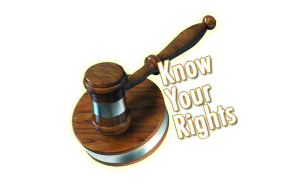 1. When you’re arrested
1. When you’re arrested
If you’re arrested, you’ll usually be taken to a police station, held in custody in a cell and then questioned.
After you’ve been taken to a police station, you may be released or charged with a crime.
Your rights in custody
The custody officer at the police station must explain your rights. You have the right to:
• get free legal advice
• tell someone where you are
• have medical help if you’re feeling ill
• see the rules the police must follow (‘Codes of Practice’)
• see a written notice telling you about your rights, eg regular breaks for food and to use the toilet (you can ask for a notice in your language) or an interpreter to explain the notice
You’ll be searched and your possessions will be kept by the police custody officer while you’re in the cell.
Young people under 18 and vulnerable adults
The police must try to contact your parent, guardian or carer if you’re under 18 or a vulnerable adult.
They must also find an ‘appropriate adult’ to come to the station to help you and be present during questioning and searching. An appropriate adult can be:
• your parent, guardian or carer
• a social worker
• another family member or friend aged 18 or over
• a volunteer aged 18 or over
The National Appropriate Adult Network provides appropriate adult services in England and Wales.
Your rights when being questioned
The police may question you about the crime you’re suspected of – this will be recorded. You don’t have to answer the questions but there could be consequences if you don’t. The police must explain this to you by reading you the police caution:
“You do not have to say anything. But, it may harm your defence if you do not mention when questioned something which you later rely on in court. Anything you do say may be given in evidence.”
2. How long you can be held in custody
The police can hold you for up to 24 hours before they have to charge you with a crime or release you.
They can apply to hold you for up to 36 or 96 hours if you’re suspected of a serious crime, eg murder.
You can be held without charge for up to 14 days If you’re arrested under the Terrorism Act.
When can be
released on bail?
The police can release you on police bail if there’s not enough evidence to charge you. You don’t have to pay to be released on police bail, but you’ll have to return to the station for further questioning when asked.
You can be released on conditional bail if the police charge you and think that you may:
• commit another offence
• fail to turn up at court
• intimidate other witnesses
• obstruct the course of justice
This means your freedom will be restricted in some way, eg they can impose a curfew on you if your offence was committed at night.






